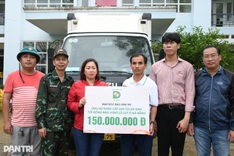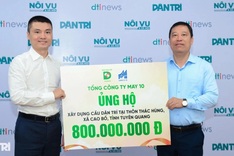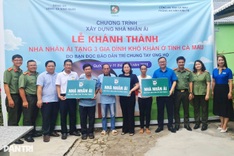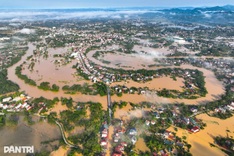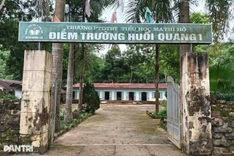Though affecting the environment at an alarming level, plastic bags keep being given away at Vietnam’s traditional markets, supermarkets and shopping centers.

Plastic bags are being given free at every local markets
The reasons vary and the solutions are still hard to find.
Plastic bags are convenient and economic. Mrs. Trinh Minh Huong, who owns a souvenir shop at Dong Xuan market in Hanoi, said one kilogram of nylon bags (one kilogram is equivalent to 200 bags) costs her about 30,000VND and she uses more than 100 bags per day. For better looking plastic bags, it is a little more expensive but customers are often given them for free and there has not been any tax or regulations on the use of plastic bags in Vietnam. Therefore, users normally throw them away after only one use and they are rarely recycled.
According to Mr. Le Van Khoa, Director of the HCM Recycling Fund, around 48,000 tonnes of plastic bags are used in Ho Chi Minh City in 2009 and this number is forecasted to increase over time.
Scientists say that most of plastic bags, especially colored ones, are made of harmful materials and when used for food storage, they can contaminate the food with toxic metals such as lead, asbestos, talcum powder that are harmful to the human brain and may cause lung cancer. It takes 500 years for plastic bags to decompose. When buried, they can slow the growth of plants, cause erosion and pollute underground water resources. When burnt, they will create toxic gas emissions such as dioxin or furan that are poisonous and can cause cancer, functional disorders and congenital malformations in newborns.
Though great efforts have been made to raise people’s awareness of the adverse impacts on the environment and human health cause by plastic bags, consumption habits cannot be changed overnight.
Metro Cash & Carry Vietnam is one of many supermarkets pioneering the plastic bag boycotting campaign. Instead of providing free-of-charge plastic bags to customers, Metro sells bags at 6,000 VND that are reusable. Big C offers two choices: free plastic bags and eco-bags that cost 6,500VND.
Other supermarkets such as Hapro, Fivimart, and Hanoi Star offer customers bar coded eco-bags registered by identification card. However, plastic bags are preferred due to the convenience and fact that their free.
“I choose plastic bags because they are free of charge and I often throw them away after one use. If I use recycled bags I have to wash them again and again and that is troublesome,” Mrs. Thanh Mai, a housewife at Doi Can Street said.
“Paper bags are friendlier to the environment but they are not as durable as nylon bags. I often use paper bags when shopping for clothes or shoes but plastic is my first choice for storing miscellaneous things like food because paper bags tear easily,” Hang, an officer, shared with me.
Furthermore, the cost of 6,000VND for one bag is nothing for high-income earners but a question mark for low-income ones and everybody likes the free-of-charge option. In Vietnam, the percentage of traditional or open-air markets is still overwhelming and it’s not easy to change traditional mindsets.
In rural areas, people no longer use banana leaves or straw to wrap, tie or store things like pork, fish, or other food items. Hundreds of plastic bags are scattered from lanes to fields. The waste collecting system is not developed fully in local provinces therefore, the effect of plastic bags on the environment is even worse.
So can habits be changed? Yes, they can be changed but it will take a lot of effort.
On August 8, the Hanoi Department of Natural Resources and Environment launched the campaign “Hanoi-No plastic bags on Sunday” to promote the restricted use of plastic bags for a greener environment. The campaign drew much attention from residents as people have become aware that the abundant usage of plastic bags causes serious environmental pollution.
Mr. Vu Van Truong, Director of the Tax Policy Department said Environmental Tax Law is scheduled to be applied in 2012 and the using of polluted products such as plastic, gas, and petroleum will be taxed based on their pollution level.
In Mexico City, one of the most polluted cities in the world, a new law has just come into effect to fine shops which give free plastic bags to their customers. Shop owners may be fined $90,000 or given a 36-hour jail term if not complying with the law.
So what can be done in Vietnam?
In May 2009, the Ministry of Natural Resources and Environment awarded “Green Brand” Prize to Phuc Le Gia Company for their green products. Le Loc, director of the company said he started his research on producing decomposable bags in 2000 and after six years his factory has successfully supplied eco-bags to the market. “I hope that there will be more companies which invest in producing decomposable bags,” Loc said. “And I also wish people will soon realize the true cost of ‘free’ plastic bags.”
(Photo by VNN)



